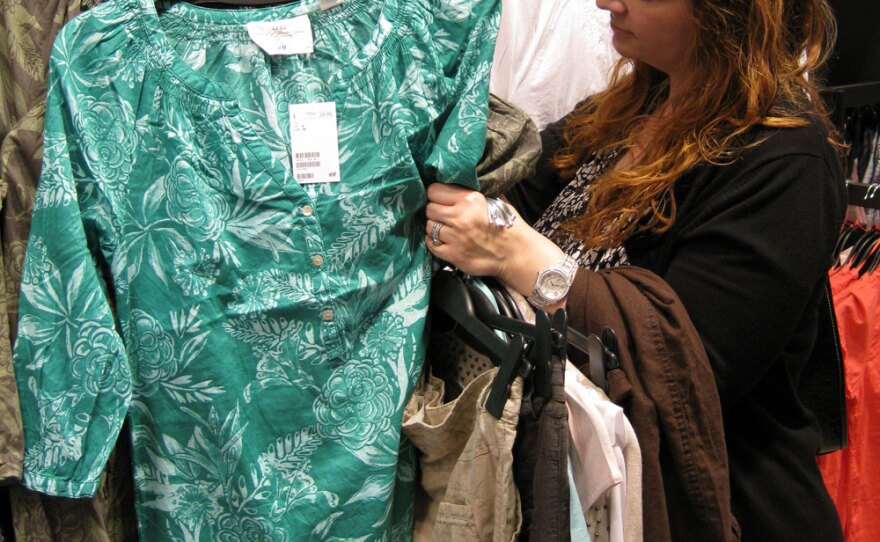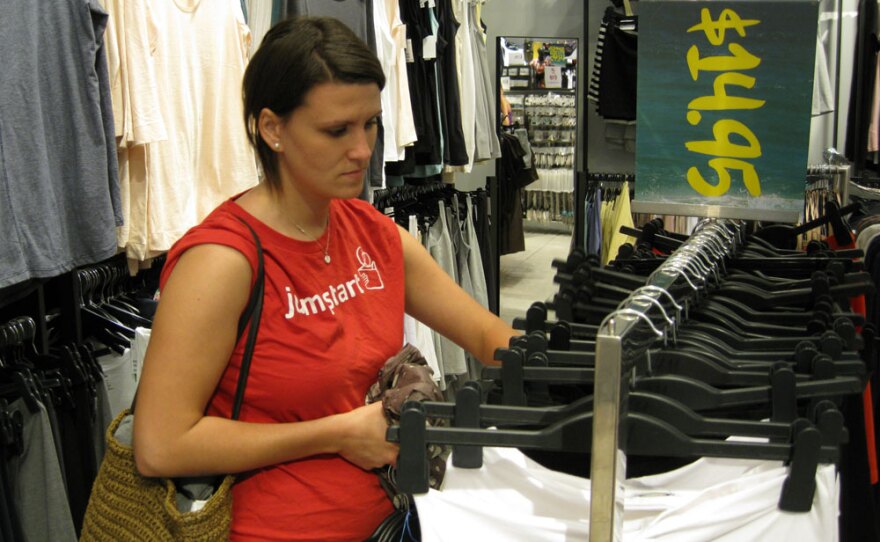On a hot, humid day in Washington, D.C., customers are lined up at the registers of an H&M clothing store waiting to make their purchases.
Meg Radunich walks the floor nearby, carrying a handful of tank tops and shorts. The 22-year-old Brigham Young University student says she lost her summer job on campus. So, she came to Washington, with just a few outfits in tow, to take an unpaid internship.
With no income, Radunich says she's not buying much these days.
"I'm kind of hanging on to stuff," Radunich says. "Before, if I had extra money, I would just let go of stuff that I bought last year or even two or three or four years ago. But now, it's not an option."
Retailers were encouraged by an uptick in shopping earlier this spring. But more recent data suggest a retail slowdown at clothing and department stores.
Still, one of the things that caught Radunich's eye was a sign advertising "Summer Tops & Shirts" for $4.95. Morningstar retail analyst Kimberly Picciola says consumers remain focused on price.
Cautionary Consumers
"We think caution is lingering among many consumers, given the employment market and some uncertainty regarding the economy," Picciola says.

Laura Tabor from Napa, Calif., is also browsing the racks at the store. She says she's tentative about whether she'll actually purchase anything.
"The fun is in the window shopping or in the putting things in your cart online, but not necessarily hitting the checkout button," Tabor says.
Overall retail sales fell 1.2 percent in May, according to the latest data from the Commerce Department. That's despite increases over the past several months. Retailers may find some comfort in recent surveys showing an uptick in consumer confidence.
The Impact Of Consumer Incentives
Nigel Gault, chief U.S. economist for IHS Global Insight, says consumers are willing to spend when they're given enough incentive. Last year's Cash for Clunkers program brought out car buyers, and the first-time-homebuyer tax credit encouraged home ownership.
Gault says the same is true in retail. For example, in March and April, many consumers bought energy-efficient appliances in response to the federal government's $300 million cash-for-appliances program that was administered by states. But spending tapered off in May when a number of state rebate programs ran out of funds.
"So the month-to-month volatility has been very much driven by incentives," Gault says.
Looking ahead, he expects overall consumer spending to grow at about a 3 percent annual rate. That's slower than the 4 percent to 5 percent growth he'd expect to see if a strong economic recovery was underway.
"In general, consumers still have lost a lot of wealth," Gault says. "Credit conditions are tight, so they're really constrained by their income growth."
Uncertainty Surrounding Back-To-School Sales
Historically, retailers have also counted on strong back-to-school sales. But Picciola, the Morningstar analyst, says retailers may face an uphill battle later this summer.
"It could be a difficult back-to-school season for some of these teen retailers given where we stand with teen unemployment levels," she says.
Consumers are likely to stay focused on the bottom line, Picciola adds. And that may give an upper hand to retailers offering competitive pricing such as dollar stores, Kohl's or Walmart.
Copyright 2023 NPR. To see more, visit https://www.npr.org. 9(MDAzMjM2NDYzMDEyMzc1Njk5NjAxNzY3OQ001))







